Auditing Report: Corporate Collapses, Regulations, and Going Concern
VerifiedAdded on 2023/04/21
|8
|2836
|113
Report
AI Summary
This report delves into the intricacies of the auditing profession, focusing on the critical role auditors play in ensuring the accuracy and reliability of financial statements. It examines the failures of auditing in the high-profile corporate collapses of Enron and Lehman Brothers, highlighting how auditors' lack of professional skepticism and independence, coupled with complex financial instruments, contributed to these crises. The report analyzes the guidance and regulations set by the International Auditing and Assurance Standards Board (IAASB) for auditing complex financial instruments. It discusses alternative forms of accounting disclosures and accountabilities, and the significance of auditor's opinions on going concern assumptions. The report underscores the importance of these elements in maintaining the integrity of financial reporting and safeguarding the interests of stakeholders.
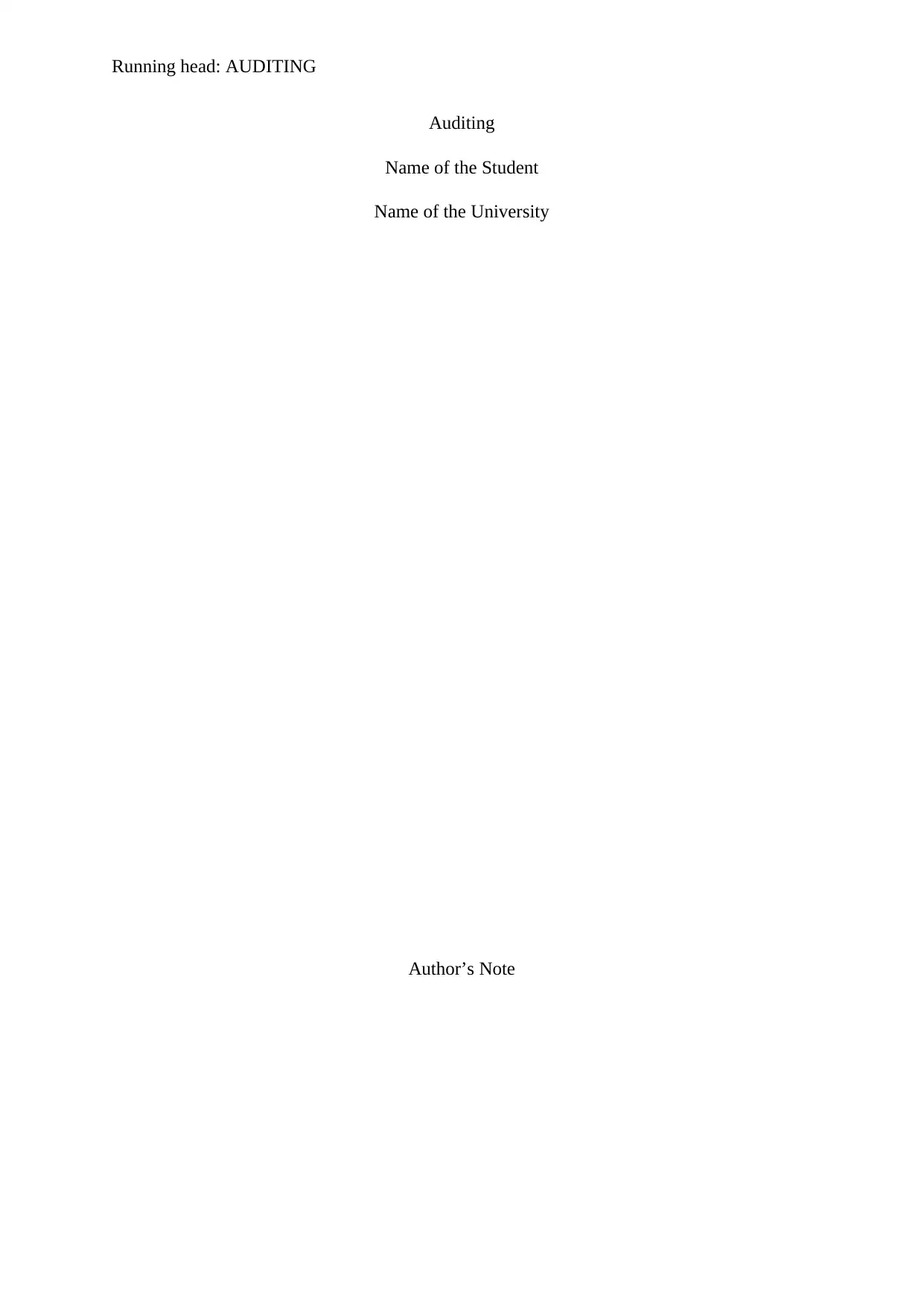
Running head: AUDITING
Auditing
Name of the Student
Name of the University
Author’s Note
Auditing
Name of the Student
Name of the University
Author’s Note
Paraphrase This Document
Need a fresh take? Get an instant paraphrase of this document with our AI Paraphraser
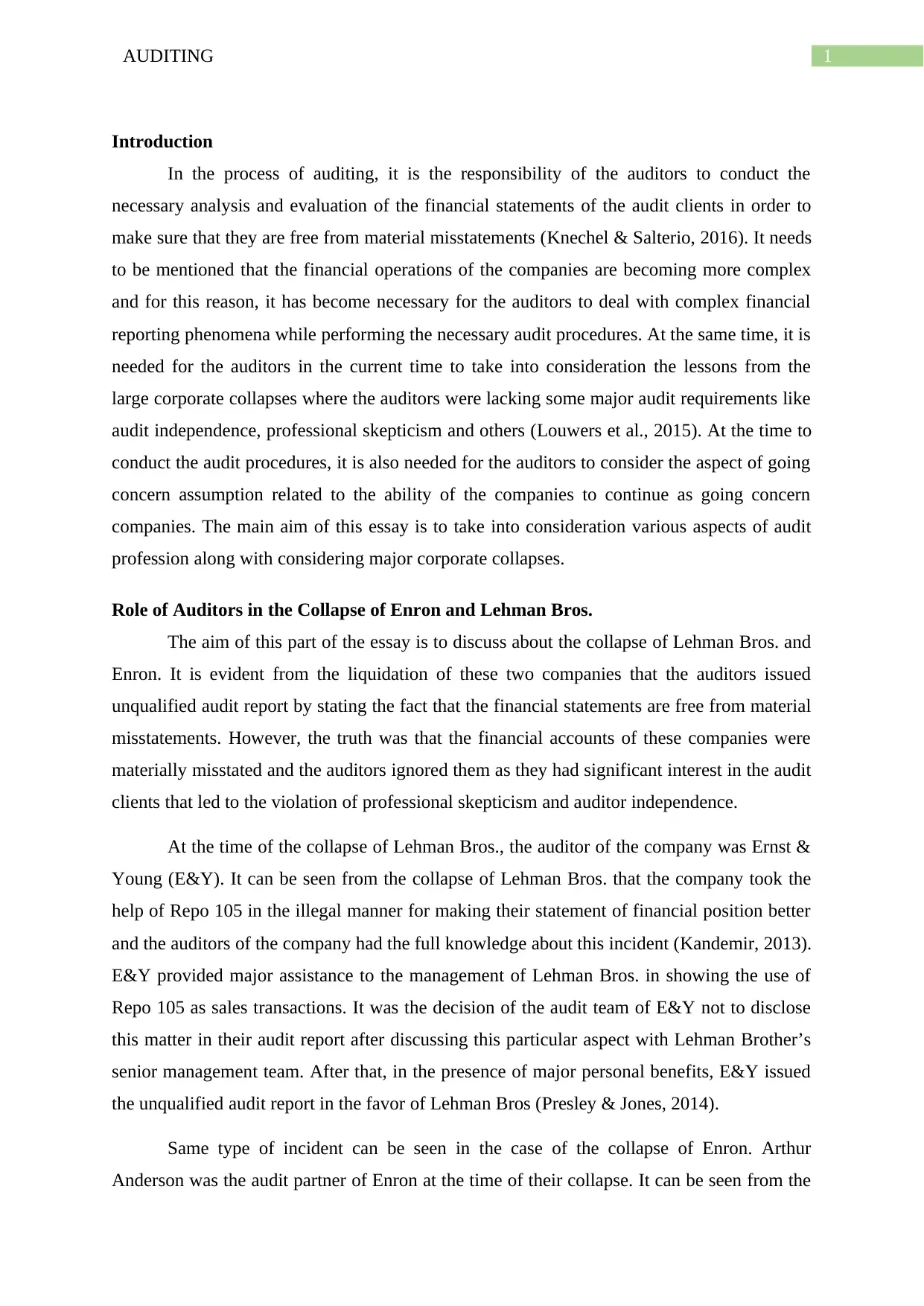
1AUDITING
Introduction
In the process of auditing, it is the responsibility of the auditors to conduct the
necessary analysis and evaluation of the financial statements of the audit clients in order to
make sure that they are free from material misstatements (Knechel & Salterio, 2016). It needs
to be mentioned that the financial operations of the companies are becoming more complex
and for this reason, it has become necessary for the auditors to deal with complex financial
reporting phenomena while performing the necessary audit procedures. At the same time, it is
needed for the auditors in the current time to take into consideration the lessons from the
large corporate collapses where the auditors were lacking some major audit requirements like
audit independence, professional skepticism and others (Louwers et al., 2015). At the time to
conduct the audit procedures, it is also needed for the auditors to consider the aspect of going
concern assumption related to the ability of the companies to continue as going concern
companies. The main aim of this essay is to take into consideration various aspects of audit
profession along with considering major corporate collapses.
Role of Auditors in the Collapse of Enron and Lehman Bros.
The aim of this part of the essay is to discuss about the collapse of Lehman Bros. and
Enron. It is evident from the liquidation of these two companies that the auditors issued
unqualified audit report by stating the fact that the financial statements are free from material
misstatements. However, the truth was that the financial accounts of these companies were
materially misstated and the auditors ignored them as they had significant interest in the audit
clients that led to the violation of professional skepticism and auditor independence.
At the time of the collapse of Lehman Bros., the auditor of the company was Ernst &
Young (E&Y). It can be seen from the collapse of Lehman Bros. that the company took the
help of Repo 105 in the illegal manner for making their statement of financial position better
and the auditors of the company had the full knowledge about this incident (Kandemir, 2013).
E&Y provided major assistance to the management of Lehman Bros. in showing the use of
Repo 105 as sales transactions. It was the decision of the audit team of E&Y not to disclose
this matter in their audit report after discussing this particular aspect with Lehman Brother’s
senior management team. After that, in the presence of major personal benefits, E&Y issued
the unqualified audit report in the favor of Lehman Bros (Presley & Jones, 2014).
Same type of incident can be seen in the case of the collapse of Enron. Arthur
Anderson was the audit partner of Enron at the time of their collapse. It can be seen from the
Introduction
In the process of auditing, it is the responsibility of the auditors to conduct the
necessary analysis and evaluation of the financial statements of the audit clients in order to
make sure that they are free from material misstatements (Knechel & Salterio, 2016). It needs
to be mentioned that the financial operations of the companies are becoming more complex
and for this reason, it has become necessary for the auditors to deal with complex financial
reporting phenomena while performing the necessary audit procedures. At the same time, it is
needed for the auditors in the current time to take into consideration the lessons from the
large corporate collapses where the auditors were lacking some major audit requirements like
audit independence, professional skepticism and others (Louwers et al., 2015). At the time to
conduct the audit procedures, it is also needed for the auditors to consider the aspect of going
concern assumption related to the ability of the companies to continue as going concern
companies. The main aim of this essay is to take into consideration various aspects of audit
profession along with considering major corporate collapses.
Role of Auditors in the Collapse of Enron and Lehman Bros.
The aim of this part of the essay is to discuss about the collapse of Lehman Bros. and
Enron. It is evident from the liquidation of these two companies that the auditors issued
unqualified audit report by stating the fact that the financial statements are free from material
misstatements. However, the truth was that the financial accounts of these companies were
materially misstated and the auditors ignored them as they had significant interest in the audit
clients that led to the violation of professional skepticism and auditor independence.
At the time of the collapse of Lehman Bros., the auditor of the company was Ernst &
Young (E&Y). It can be seen from the collapse of Lehman Bros. that the company took the
help of Repo 105 in the illegal manner for making their statement of financial position better
and the auditors of the company had the full knowledge about this incident (Kandemir, 2013).
E&Y provided major assistance to the management of Lehman Bros. in showing the use of
Repo 105 as sales transactions. It was the decision of the audit team of E&Y not to disclose
this matter in their audit report after discussing this particular aspect with Lehman Brother’s
senior management team. After that, in the presence of major personal benefits, E&Y issued
the unqualified audit report in the favor of Lehman Bros (Presley & Jones, 2014).
Same type of incident can be seen in the case of the collapse of Enron. Arthur
Anderson was the audit partner of Enron at the time of their collapse. It can be seen from the
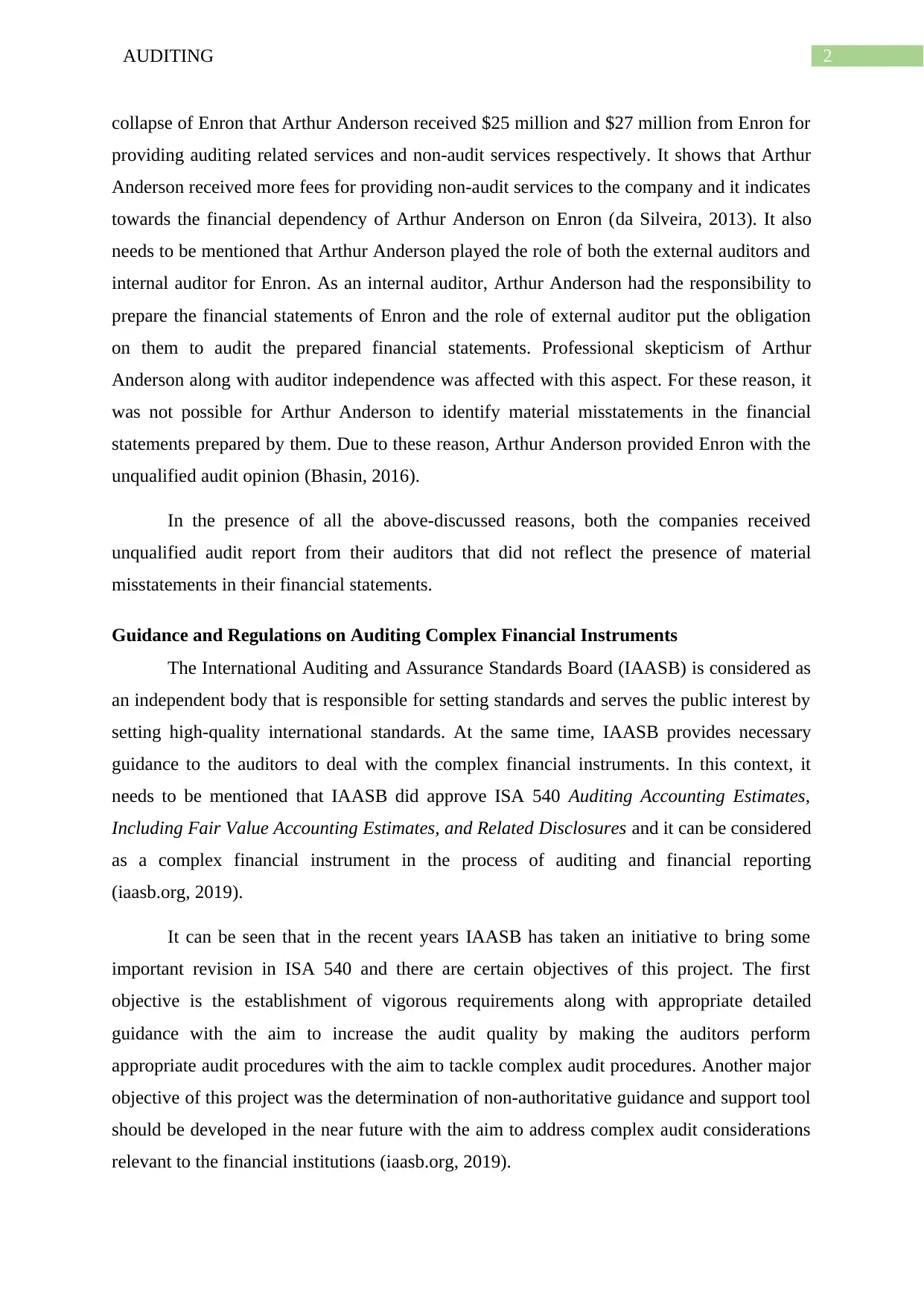
2AUDITING
collapse of Enron that Arthur Anderson received $25 million and $27 million from Enron for
providing auditing related services and non-audit services respectively. It shows that Arthur
Anderson received more fees for providing non-audit services to the company and it indicates
towards the financial dependency of Arthur Anderson on Enron (da Silveira, 2013). It also
needs to be mentioned that Arthur Anderson played the role of both the external auditors and
internal auditor for Enron. As an internal auditor, Arthur Anderson had the responsibility to
prepare the financial statements of Enron and the role of external auditor put the obligation
on them to audit the prepared financial statements. Professional skepticism of Arthur
Anderson along with auditor independence was affected with this aspect. For these reason, it
was not possible for Arthur Anderson to identify material misstatements in the financial
statements prepared by them. Due to these reason, Arthur Anderson provided Enron with the
unqualified audit opinion (Bhasin, 2016).
In the presence of all the above-discussed reasons, both the companies received
unqualified audit report from their auditors that did not reflect the presence of material
misstatements in their financial statements.
Guidance and Regulations on Auditing Complex Financial Instruments
The International Auditing and Assurance Standards Board (IAASB) is considered as
an independent body that is responsible for setting standards and serves the public interest by
setting high-quality international standards. At the same time, IAASB provides necessary
guidance to the auditors to deal with the complex financial instruments. In this context, it
needs to be mentioned that IAASB did approve ISA 540 Auditing Accounting Estimates,
Including Fair Value Accounting Estimates, and Related Disclosures and it can be considered
as a complex financial instrument in the process of auditing and financial reporting
(iaasb.org, 2019).
It can be seen that in the recent years IAASB has taken an initiative to bring some
important revision in ISA 540 and there are certain objectives of this project. The first
objective is the establishment of vigorous requirements along with appropriate detailed
guidance with the aim to increase the audit quality by making the auditors perform
appropriate audit procedures with the aim to tackle complex audit procedures. Another major
objective of this project was the determination of non-authoritative guidance and support tool
should be developed in the near future with the aim to address complex audit considerations
relevant to the financial institutions (iaasb.org, 2019).
collapse of Enron that Arthur Anderson received $25 million and $27 million from Enron for
providing auditing related services and non-audit services respectively. It shows that Arthur
Anderson received more fees for providing non-audit services to the company and it indicates
towards the financial dependency of Arthur Anderson on Enron (da Silveira, 2013). It also
needs to be mentioned that Arthur Anderson played the role of both the external auditors and
internal auditor for Enron. As an internal auditor, Arthur Anderson had the responsibility to
prepare the financial statements of Enron and the role of external auditor put the obligation
on them to audit the prepared financial statements. Professional skepticism of Arthur
Anderson along with auditor independence was affected with this aspect. For these reason, it
was not possible for Arthur Anderson to identify material misstatements in the financial
statements prepared by them. Due to these reason, Arthur Anderson provided Enron with the
unqualified audit opinion (Bhasin, 2016).
In the presence of all the above-discussed reasons, both the companies received
unqualified audit report from their auditors that did not reflect the presence of material
misstatements in their financial statements.
Guidance and Regulations on Auditing Complex Financial Instruments
The International Auditing and Assurance Standards Board (IAASB) is considered as
an independent body that is responsible for setting standards and serves the public interest by
setting high-quality international standards. At the same time, IAASB provides necessary
guidance to the auditors to deal with the complex financial instruments. In this context, it
needs to be mentioned that IAASB did approve ISA 540 Auditing Accounting Estimates,
Including Fair Value Accounting Estimates, and Related Disclosures and it can be considered
as a complex financial instrument in the process of auditing and financial reporting
(iaasb.org, 2019).
It can be seen that in the recent years IAASB has taken an initiative to bring some
important revision in ISA 540 and there are certain objectives of this project. The first
objective is the establishment of vigorous requirements along with appropriate detailed
guidance with the aim to increase the audit quality by making the auditors perform
appropriate audit procedures with the aim to tackle complex audit procedures. Another major
objective of this project was the determination of non-authoritative guidance and support tool
should be developed in the near future with the aim to address complex audit considerations
relevant to the financial institutions (iaasb.org, 2019).
⊘ This is a preview!⊘
Do you want full access?
Subscribe today to unlock all pages.

Trusted by 1+ million students worldwide
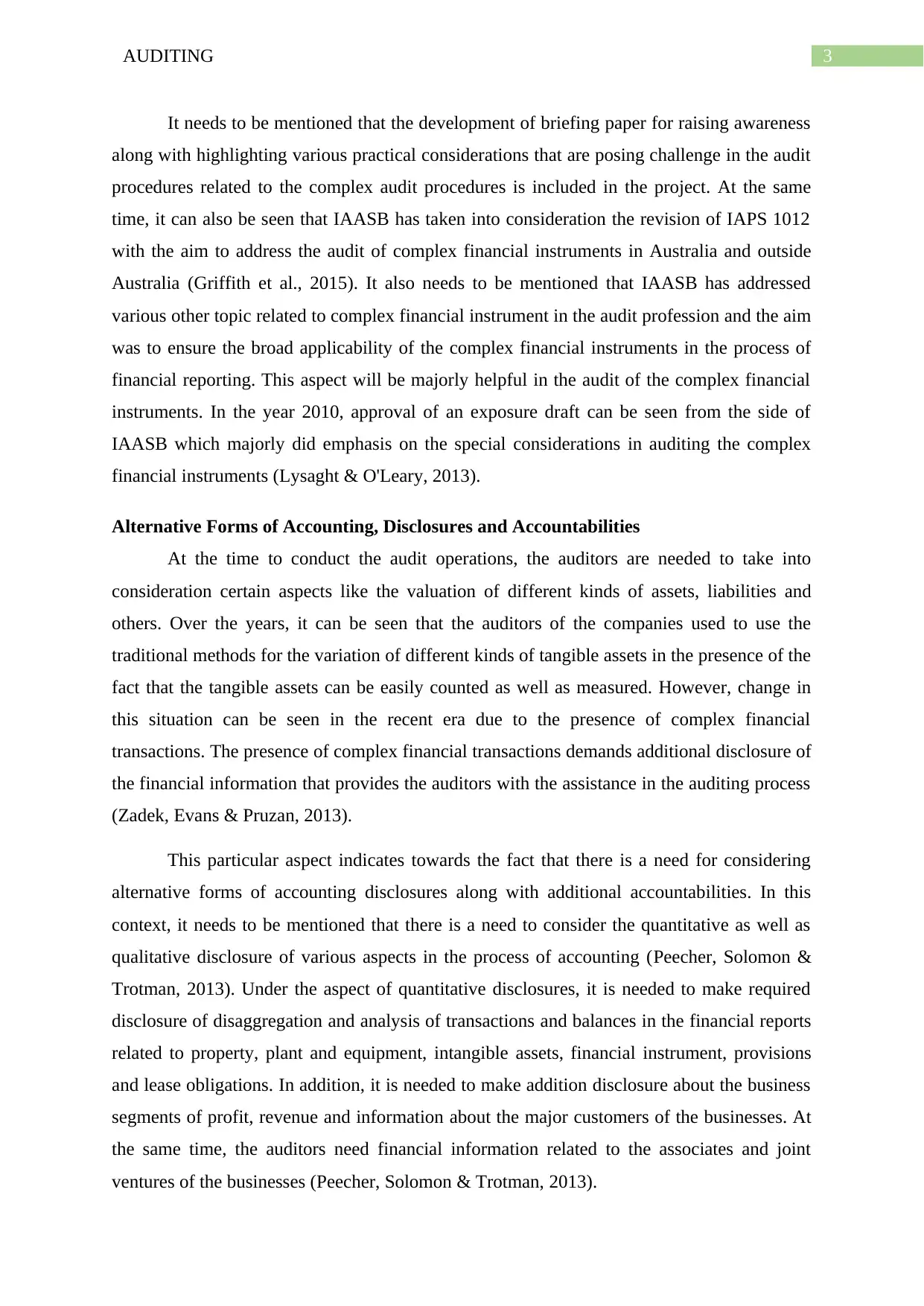
3AUDITING
It needs to be mentioned that the development of briefing paper for raising awareness
along with highlighting various practical considerations that are posing challenge in the audit
procedures related to the complex audit procedures is included in the project. At the same
time, it can also be seen that IAASB has taken into consideration the revision of IAPS 1012
with the aim to address the audit of complex financial instruments in Australia and outside
Australia (Griffith et al., 2015). It also needs to be mentioned that IAASB has addressed
various other topic related to complex financial instrument in the audit profession and the aim
was to ensure the broad applicability of the complex financial instruments in the process of
financial reporting. This aspect will be majorly helpful in the audit of the complex financial
instruments. In the year 2010, approval of an exposure draft can be seen from the side of
IAASB which majorly did emphasis on the special considerations in auditing the complex
financial instruments (Lysaght & O'Leary, 2013).
Alternative Forms of Accounting, Disclosures and Accountabilities
At the time to conduct the audit operations, the auditors are needed to take into
consideration certain aspects like the valuation of different kinds of assets, liabilities and
others. Over the years, it can be seen that the auditors of the companies used to use the
traditional methods for the variation of different kinds of tangible assets in the presence of the
fact that the tangible assets can be easily counted as well as measured. However, change in
this situation can be seen in the recent era due to the presence of complex financial
transactions. The presence of complex financial transactions demands additional disclosure of
the financial information that provides the auditors with the assistance in the auditing process
(Zadek, Evans & Pruzan, 2013).
This particular aspect indicates towards the fact that there is a need for considering
alternative forms of accounting disclosures along with additional accountabilities. In this
context, it needs to be mentioned that there is a need to consider the quantitative as well as
qualitative disclosure of various aspects in the process of accounting (Peecher, Solomon &
Trotman, 2013). Under the aspect of quantitative disclosures, it is needed to make required
disclosure of disaggregation and analysis of transactions and balances in the financial reports
related to property, plant and equipment, intangible assets, financial instrument, provisions
and lease obligations. In addition, it is needed to make addition disclosure about the business
segments of profit, revenue and information about the major customers of the businesses. At
the same time, the auditors need financial information related to the associates and joint
ventures of the businesses (Peecher, Solomon & Trotman, 2013).
It needs to be mentioned that the development of briefing paper for raising awareness
along with highlighting various practical considerations that are posing challenge in the audit
procedures related to the complex audit procedures is included in the project. At the same
time, it can also be seen that IAASB has taken into consideration the revision of IAPS 1012
with the aim to address the audit of complex financial instruments in Australia and outside
Australia (Griffith et al., 2015). It also needs to be mentioned that IAASB has addressed
various other topic related to complex financial instrument in the audit profession and the aim
was to ensure the broad applicability of the complex financial instruments in the process of
financial reporting. This aspect will be majorly helpful in the audit of the complex financial
instruments. In the year 2010, approval of an exposure draft can be seen from the side of
IAASB which majorly did emphasis on the special considerations in auditing the complex
financial instruments (Lysaght & O'Leary, 2013).
Alternative Forms of Accounting, Disclosures and Accountabilities
At the time to conduct the audit operations, the auditors are needed to take into
consideration certain aspects like the valuation of different kinds of assets, liabilities and
others. Over the years, it can be seen that the auditors of the companies used to use the
traditional methods for the variation of different kinds of tangible assets in the presence of the
fact that the tangible assets can be easily counted as well as measured. However, change in
this situation can be seen in the recent era due to the presence of complex financial
transactions. The presence of complex financial transactions demands additional disclosure of
the financial information that provides the auditors with the assistance in the auditing process
(Zadek, Evans & Pruzan, 2013).
This particular aspect indicates towards the fact that there is a need for considering
alternative forms of accounting disclosures along with additional accountabilities. In this
context, it needs to be mentioned that there is a need to consider the quantitative as well as
qualitative disclosure of various aspects in the process of accounting (Peecher, Solomon &
Trotman, 2013). Under the aspect of quantitative disclosures, it is needed to make required
disclosure of disaggregation and analysis of transactions and balances in the financial reports
related to property, plant and equipment, intangible assets, financial instrument, provisions
and lease obligations. In addition, it is needed to make addition disclosure about the business
segments of profit, revenue and information about the major customers of the businesses. At
the same time, the auditors need financial information related to the associates and joint
ventures of the businesses (Peecher, Solomon & Trotman, 2013).
Paraphrase This Document
Need a fresh take? Get an instant paraphrase of this document with our AI Paraphraser
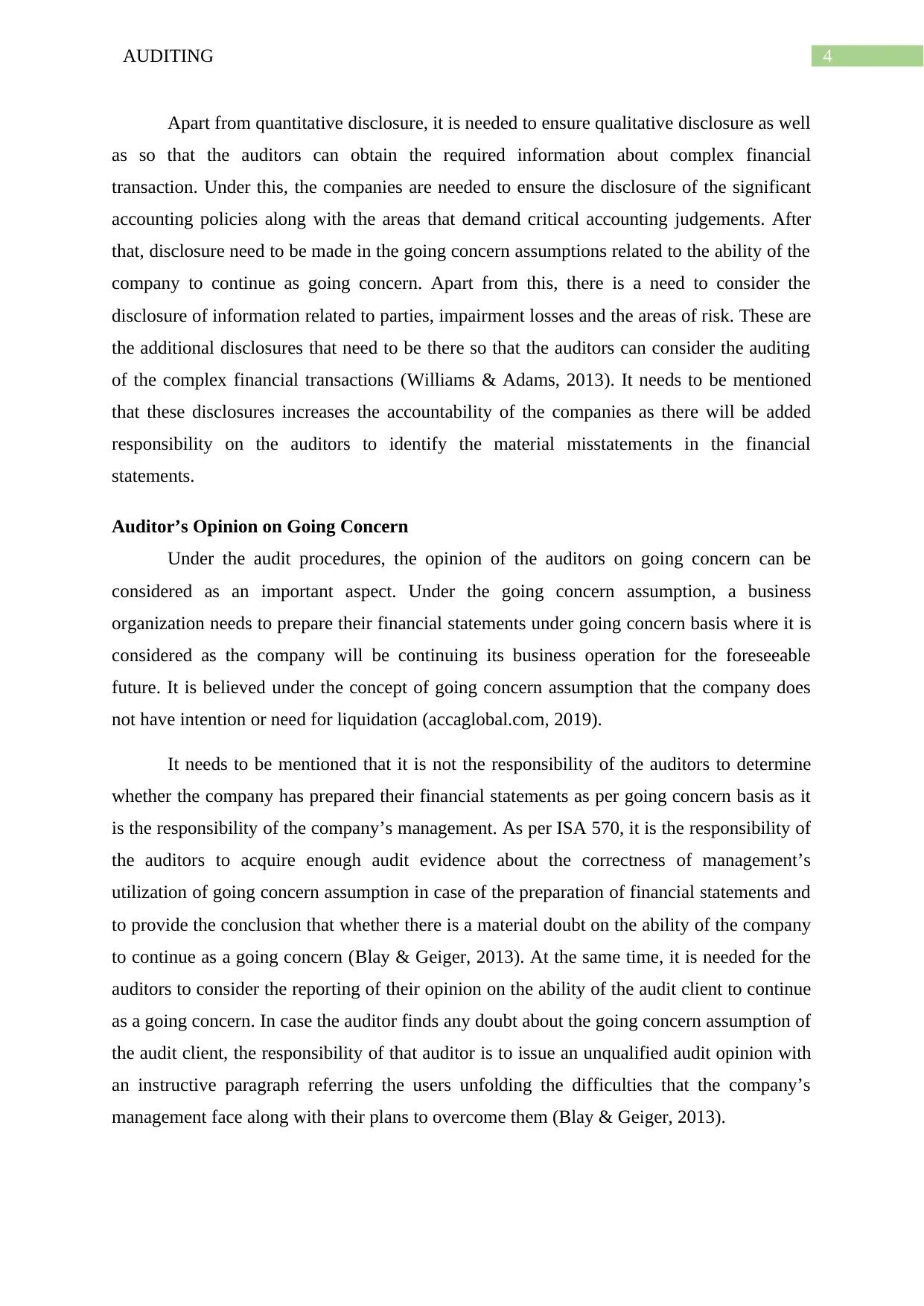
4AUDITING
Apart from quantitative disclosure, it is needed to ensure qualitative disclosure as well
as so that the auditors can obtain the required information about complex financial
transaction. Under this, the companies are needed to ensure the disclosure of the significant
accounting policies along with the areas that demand critical accounting judgements. After
that, disclosure need to be made in the going concern assumptions related to the ability of the
company to continue as going concern. Apart from this, there is a need to consider the
disclosure of information related to parties, impairment losses and the areas of risk. These are
the additional disclosures that need to be there so that the auditors can consider the auditing
of the complex financial transactions (Williams & Adams, 2013). It needs to be mentioned
that these disclosures increases the accountability of the companies as there will be added
responsibility on the auditors to identify the material misstatements in the financial
statements.
Auditor’s Opinion on Going Concern
Under the audit procedures, the opinion of the auditors on going concern can be
considered as an important aspect. Under the going concern assumption, a business
organization needs to prepare their financial statements under going concern basis where it is
considered as the company will be continuing its business operation for the foreseeable
future. It is believed under the concept of going concern assumption that the company does
not have intention or need for liquidation (accaglobal.com, 2019).
It needs to be mentioned that it is not the responsibility of the auditors to determine
whether the company has prepared their financial statements as per going concern basis as it
is the responsibility of the company’s management. As per ISA 570, it is the responsibility of
the auditors to acquire enough audit evidence about the correctness of management’s
utilization of going concern assumption in case of the preparation of financial statements and
to provide the conclusion that whether there is a material doubt on the ability of the company
to continue as a going concern (Blay & Geiger, 2013). At the same time, it is needed for the
auditors to consider the reporting of their opinion on the ability of the audit client to continue
as a going concern. In case the auditor finds any doubt about the going concern assumption of
the audit client, the responsibility of that auditor is to issue an unqualified audit opinion with
an instructive paragraph referring the users unfolding the difficulties that the company’s
management face along with their plans to overcome them (Blay & Geiger, 2013).
Apart from quantitative disclosure, it is needed to ensure qualitative disclosure as well
as so that the auditors can obtain the required information about complex financial
transaction. Under this, the companies are needed to ensure the disclosure of the significant
accounting policies along with the areas that demand critical accounting judgements. After
that, disclosure need to be made in the going concern assumptions related to the ability of the
company to continue as going concern. Apart from this, there is a need to consider the
disclosure of information related to parties, impairment losses and the areas of risk. These are
the additional disclosures that need to be there so that the auditors can consider the auditing
of the complex financial transactions (Williams & Adams, 2013). It needs to be mentioned
that these disclosures increases the accountability of the companies as there will be added
responsibility on the auditors to identify the material misstatements in the financial
statements.
Auditor’s Opinion on Going Concern
Under the audit procedures, the opinion of the auditors on going concern can be
considered as an important aspect. Under the going concern assumption, a business
organization needs to prepare their financial statements under going concern basis where it is
considered as the company will be continuing its business operation for the foreseeable
future. It is believed under the concept of going concern assumption that the company does
not have intention or need for liquidation (accaglobal.com, 2019).
It needs to be mentioned that it is not the responsibility of the auditors to determine
whether the company has prepared their financial statements as per going concern basis as it
is the responsibility of the company’s management. As per ISA 570, it is the responsibility of
the auditors to acquire enough audit evidence about the correctness of management’s
utilization of going concern assumption in case of the preparation of financial statements and
to provide the conclusion that whether there is a material doubt on the ability of the company
to continue as a going concern (Blay & Geiger, 2013). At the same time, it is needed for the
auditors to consider the reporting of their opinion on the ability of the audit client to continue
as a going concern. In case the auditor finds any doubt about the going concern assumption of
the audit client, the responsibility of that auditor is to issue an unqualified audit opinion with
an instructive paragraph referring the users unfolding the difficulties that the company’s
management face along with their plans to overcome them (Blay & Geiger, 2013).
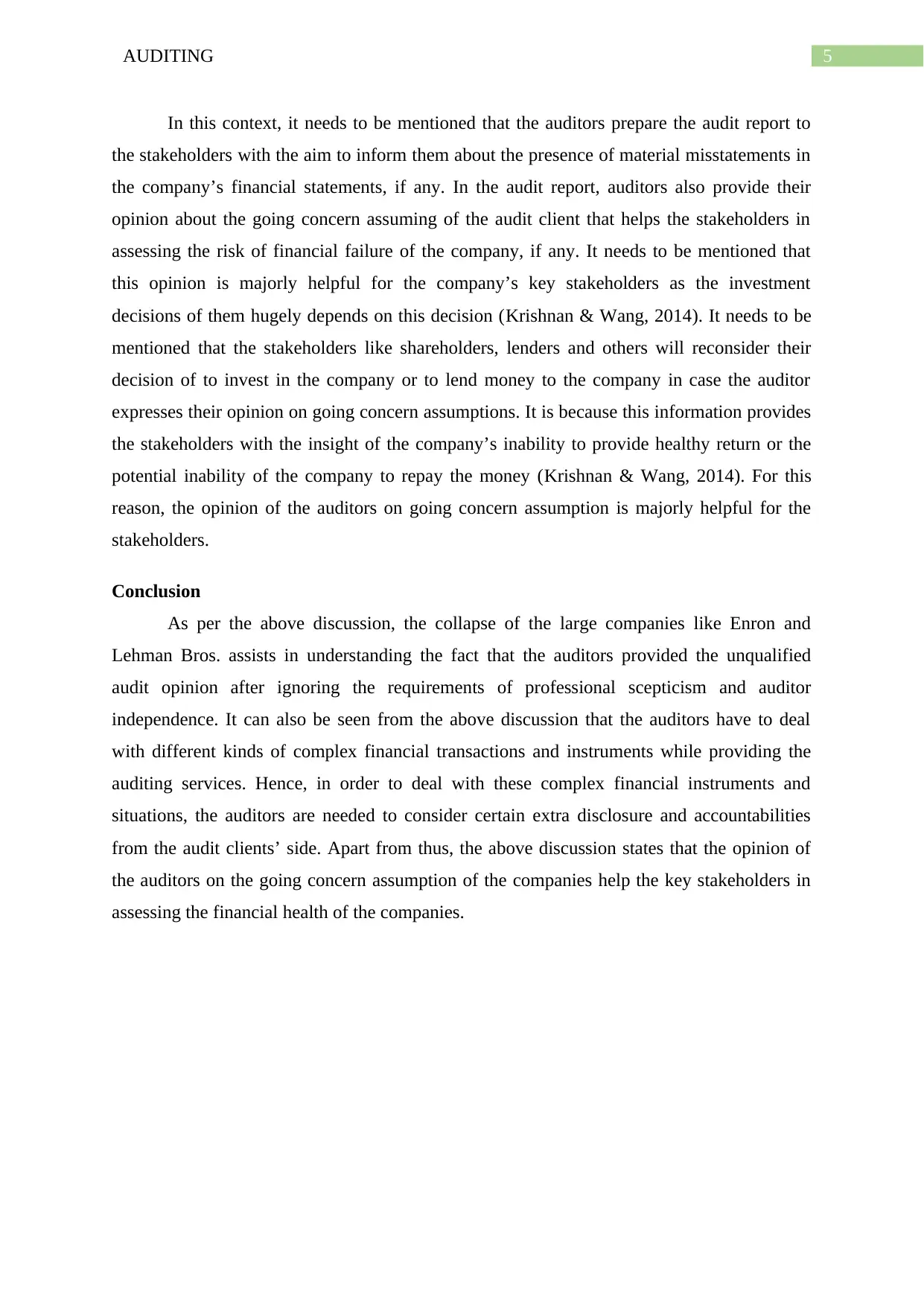
5AUDITING
In this context, it needs to be mentioned that the auditors prepare the audit report to
the stakeholders with the aim to inform them about the presence of material misstatements in
the company’s financial statements, if any. In the audit report, auditors also provide their
opinion about the going concern assuming of the audit client that helps the stakeholders in
assessing the risk of financial failure of the company, if any. It needs to be mentioned that
this opinion is majorly helpful for the company’s key stakeholders as the investment
decisions of them hugely depends on this decision (Krishnan & Wang, 2014). It needs to be
mentioned that the stakeholders like shareholders, lenders and others will reconsider their
decision of to invest in the company or to lend money to the company in case the auditor
expresses their opinion on going concern assumptions. It is because this information provides
the stakeholders with the insight of the company’s inability to provide healthy return or the
potential inability of the company to repay the money (Krishnan & Wang, 2014). For this
reason, the opinion of the auditors on going concern assumption is majorly helpful for the
stakeholders.
Conclusion
As per the above discussion, the collapse of the large companies like Enron and
Lehman Bros. assists in understanding the fact that the auditors provided the unqualified
audit opinion after ignoring the requirements of professional scepticism and auditor
independence. It can also be seen from the above discussion that the auditors have to deal
with different kinds of complex financial transactions and instruments while providing the
auditing services. Hence, in order to deal with these complex financial instruments and
situations, the auditors are needed to consider certain extra disclosure and accountabilities
from the audit clients’ side. Apart from thus, the above discussion states that the opinion of
the auditors on the going concern assumption of the companies help the key stakeholders in
assessing the financial health of the companies.
In this context, it needs to be mentioned that the auditors prepare the audit report to
the stakeholders with the aim to inform them about the presence of material misstatements in
the company’s financial statements, if any. In the audit report, auditors also provide their
opinion about the going concern assuming of the audit client that helps the stakeholders in
assessing the risk of financial failure of the company, if any. It needs to be mentioned that
this opinion is majorly helpful for the company’s key stakeholders as the investment
decisions of them hugely depends on this decision (Krishnan & Wang, 2014). It needs to be
mentioned that the stakeholders like shareholders, lenders and others will reconsider their
decision of to invest in the company or to lend money to the company in case the auditor
expresses their opinion on going concern assumptions. It is because this information provides
the stakeholders with the insight of the company’s inability to provide healthy return or the
potential inability of the company to repay the money (Krishnan & Wang, 2014). For this
reason, the opinion of the auditors on going concern assumption is majorly helpful for the
stakeholders.
Conclusion
As per the above discussion, the collapse of the large companies like Enron and
Lehman Bros. assists in understanding the fact that the auditors provided the unqualified
audit opinion after ignoring the requirements of professional scepticism and auditor
independence. It can also be seen from the above discussion that the auditors have to deal
with different kinds of complex financial transactions and instruments while providing the
auditing services. Hence, in order to deal with these complex financial instruments and
situations, the auditors are needed to consider certain extra disclosure and accountabilities
from the audit clients’ side. Apart from thus, the above discussion states that the opinion of
the auditors on the going concern assumption of the companies help the key stakeholders in
assessing the financial health of the companies.
⊘ This is a preview!⊘
Do you want full access?
Subscribe today to unlock all pages.

Trusted by 1+ million students worldwide
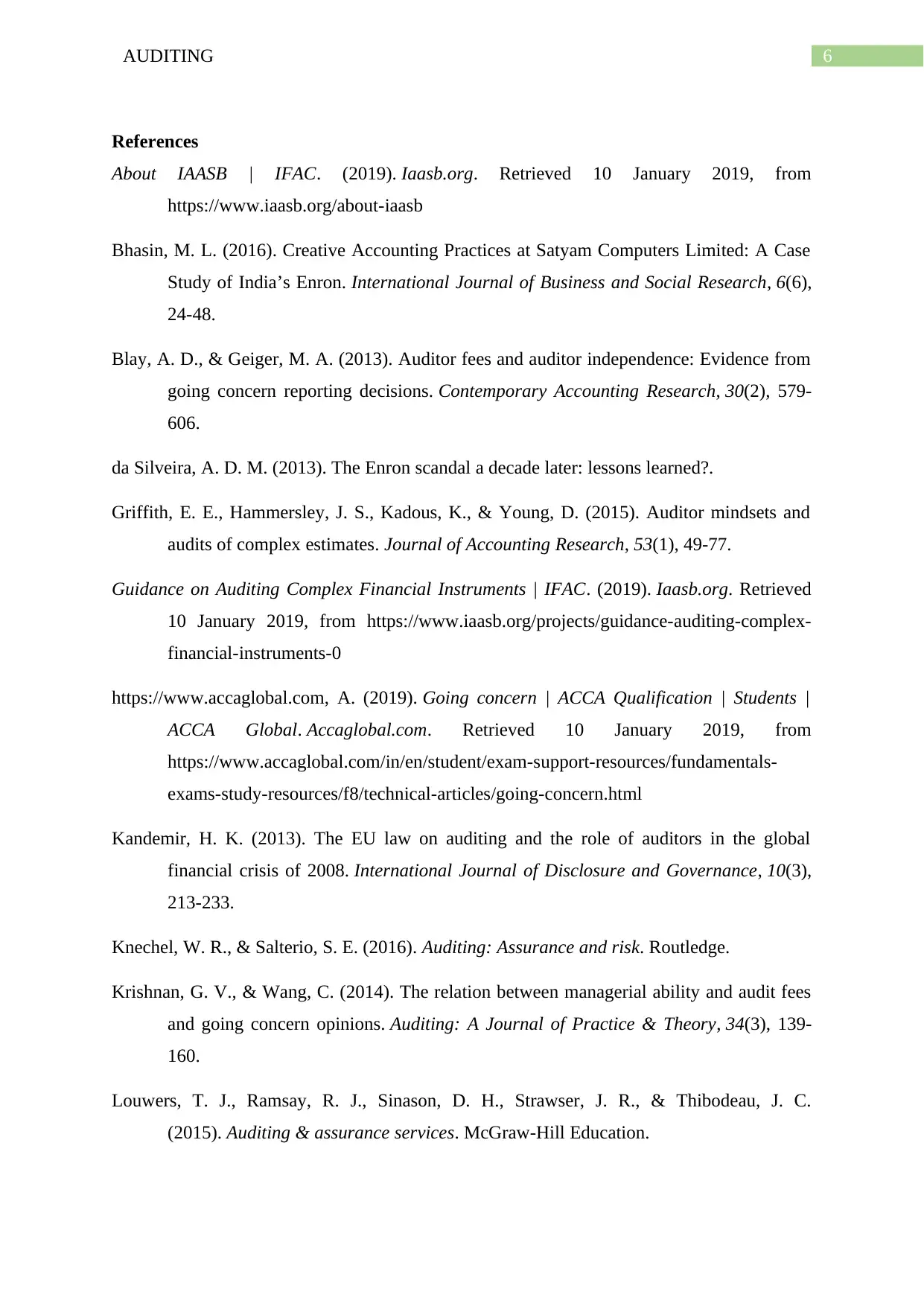
6AUDITING
References
About IAASB | IFAC. (2019). Iaasb.org. Retrieved 10 January 2019, from
https://www.iaasb.org/about-iaasb
Bhasin, M. L. (2016). Creative Accounting Practices at Satyam Computers Limited: A Case
Study of India’s Enron. International Journal of Business and Social Research, 6(6),
24-48.
Blay, A. D., & Geiger, M. A. (2013). Auditor fees and auditor independence: Evidence from
going concern reporting decisions. Contemporary Accounting Research, 30(2), 579-
606.
da Silveira, A. D. M. (2013). The Enron scandal a decade later: lessons learned?.
Griffith, E. E., Hammersley, J. S., Kadous, K., & Young, D. (2015). Auditor mindsets and
audits of complex estimates. Journal of Accounting Research, 53(1), 49-77.
Guidance on Auditing Complex Financial Instruments | IFAC. (2019). Iaasb.org. Retrieved
10 January 2019, from https://www.iaasb.org/projects/guidance-auditing-complex-
financial-instruments-0
https://www.accaglobal.com, A. (2019). Going concern | ACCA Qualification | Students |
ACCA Global. Accaglobal.com. Retrieved 10 January 2019, from
https://www.accaglobal.com/in/en/student/exam-support-resources/fundamentals-
exams-study-resources/f8/technical-articles/going-concern.html
Kandemir, H. K. (2013). The EU law on auditing and the role of auditors in the global
financial crisis of 2008. International Journal of Disclosure and Governance, 10(3),
213-233.
Knechel, W. R., & Salterio, S. E. (2016). Auditing: Assurance and risk. Routledge.
Krishnan, G. V., & Wang, C. (2014). The relation between managerial ability and audit fees
and going concern opinions. Auditing: A Journal of Practice & Theory, 34(3), 139-
160.
Louwers, T. J., Ramsay, R. J., Sinason, D. H., Strawser, J. R., & Thibodeau, J. C.
(2015). Auditing & assurance services. McGraw-Hill Education.
References
About IAASB | IFAC. (2019). Iaasb.org. Retrieved 10 January 2019, from
https://www.iaasb.org/about-iaasb
Bhasin, M. L. (2016). Creative Accounting Practices at Satyam Computers Limited: A Case
Study of India’s Enron. International Journal of Business and Social Research, 6(6),
24-48.
Blay, A. D., & Geiger, M. A. (2013). Auditor fees and auditor independence: Evidence from
going concern reporting decisions. Contemporary Accounting Research, 30(2), 579-
606.
da Silveira, A. D. M. (2013). The Enron scandal a decade later: lessons learned?.
Griffith, E. E., Hammersley, J. S., Kadous, K., & Young, D. (2015). Auditor mindsets and
audits of complex estimates. Journal of Accounting Research, 53(1), 49-77.
Guidance on Auditing Complex Financial Instruments | IFAC. (2019). Iaasb.org. Retrieved
10 January 2019, from https://www.iaasb.org/projects/guidance-auditing-complex-
financial-instruments-0
https://www.accaglobal.com, A. (2019). Going concern | ACCA Qualification | Students |
ACCA Global. Accaglobal.com. Retrieved 10 January 2019, from
https://www.accaglobal.com/in/en/student/exam-support-resources/fundamentals-
exams-study-resources/f8/technical-articles/going-concern.html
Kandemir, H. K. (2013). The EU law on auditing and the role of auditors in the global
financial crisis of 2008. International Journal of Disclosure and Governance, 10(3),
213-233.
Knechel, W. R., & Salterio, S. E. (2016). Auditing: Assurance and risk. Routledge.
Krishnan, G. V., & Wang, C. (2014). The relation between managerial ability and audit fees
and going concern opinions. Auditing: A Journal of Practice & Theory, 34(3), 139-
160.
Louwers, T. J., Ramsay, R. J., Sinason, D. H., Strawser, J. R., & Thibodeau, J. C.
(2015). Auditing & assurance services. McGraw-Hill Education.
Paraphrase This Document
Need a fresh take? Get an instant paraphrase of this document with our AI Paraphraser
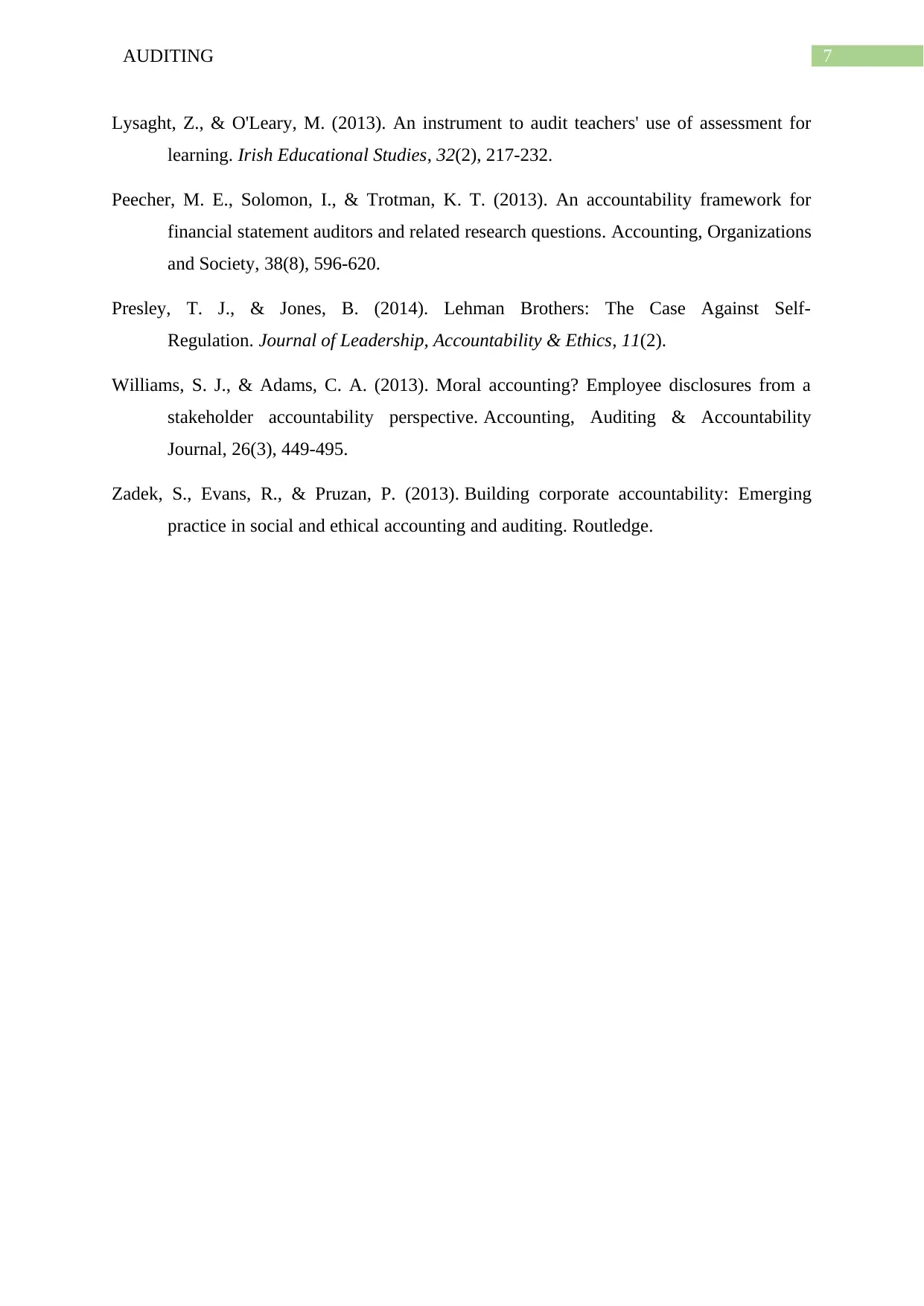
7AUDITING
Lysaght, Z., & O'Leary, M. (2013). An instrument to audit teachers' use of assessment for
learning. Irish Educational Studies, 32(2), 217-232.
Peecher, M. E., Solomon, I., & Trotman, K. T. (2013). An accountability framework for
financial statement auditors and related research questions. Accounting, Organizations
and Society, 38(8), 596-620.
Presley, T. J., & Jones, B. (2014). Lehman Brothers: The Case Against Self-
Regulation. Journal of Leadership, Accountability & Ethics, 11(2).
Williams, S. J., & Adams, C. A. (2013). Moral accounting? Employee disclosures from a
stakeholder accountability perspective. Accounting, Auditing & Accountability
Journal, 26(3), 449-495.
Zadek, S., Evans, R., & Pruzan, P. (2013). Building corporate accountability: Emerging
practice in social and ethical accounting and auditing. Routledge.
Lysaght, Z., & O'Leary, M. (2013). An instrument to audit teachers' use of assessment for
learning. Irish Educational Studies, 32(2), 217-232.
Peecher, M. E., Solomon, I., & Trotman, K. T. (2013). An accountability framework for
financial statement auditors and related research questions. Accounting, Organizations
and Society, 38(8), 596-620.
Presley, T. J., & Jones, B. (2014). Lehman Brothers: The Case Against Self-
Regulation. Journal of Leadership, Accountability & Ethics, 11(2).
Williams, S. J., & Adams, C. A. (2013). Moral accounting? Employee disclosures from a
stakeholder accountability perspective. Accounting, Auditing & Accountability
Journal, 26(3), 449-495.
Zadek, S., Evans, R., & Pruzan, P. (2013). Building corporate accountability: Emerging
practice in social and ethical accounting and auditing. Routledge.
1 out of 8
Related Documents
Your All-in-One AI-Powered Toolkit for Academic Success.
+13062052269
info@desklib.com
Available 24*7 on WhatsApp / Email
![[object Object]](/_next/static/media/star-bottom.7253800d.svg)
Unlock your academic potential
Copyright © 2020–2026 A2Z Services. All Rights Reserved. Developed and managed by ZUCOL.




